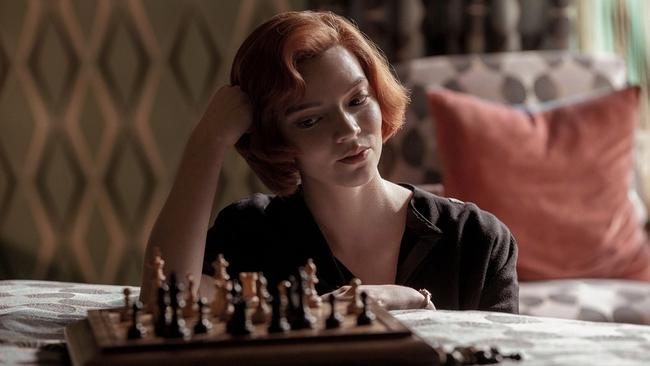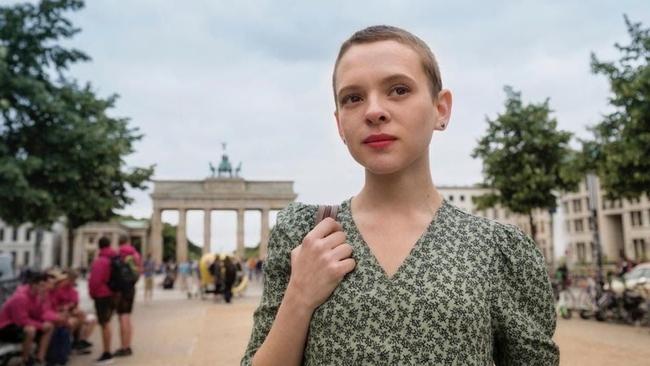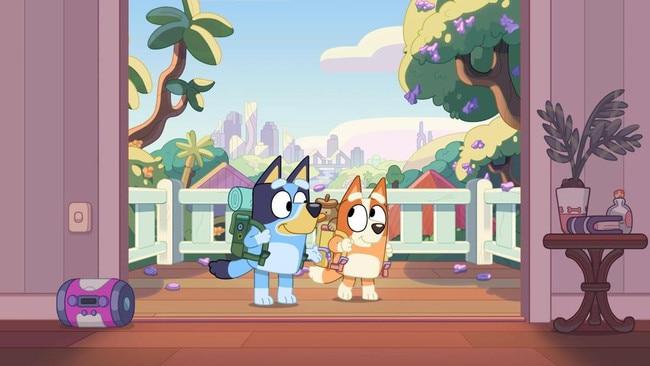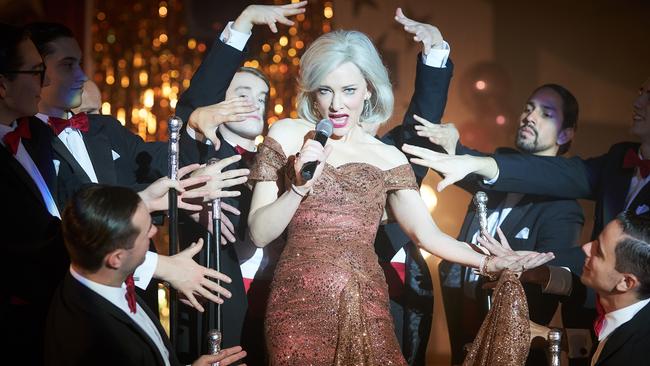The best of television in 2020
In a year that so many would prefer to forget, there has been so much to see on television and celebrate as the box helped us cope.

It was a year when TV became even more important in our lives, more of us discovering the shows of this so-called Golden Age with their formal complexity, narrative coherence and the power of their cinematic aesthetic. TV filled in the lost hours during the pandemic, allowing us to connect, through what Clive James called in his lovely little book, Play All, which explores so wittily his late-life obsession with binge watching, the “new, persuasive and irresistible vocabulary of the imagination”.
As he suggested images on the TV screen are becoming one’s first frame of cultural reference, screen stories now having the common currency once held by stories on the page. There was a fear when we first encountered the ennui of isolation that production would come to a screeching halt like the lives of so many of us – especially those in the entertainment industry – but shows came at a speed that left us breathless. Or at least I found it hard to keep up, so many clever shows like Noughts + Crosses, The Great, The Queen’s Gambit, Unorthodox and The Good Lord Bird still on the list.
Lovecraft Country was high on the slate of great shows. Creator Misha Green deconstructing the works of trenchant racist and anti-Semitic bigot H.P. Lovecraft, inventor of the so-called “cosmic horror” genre, and using Lovecraft as a kind of thematic connection between his supernatural awfulness and the revulsions of white supremacy in the US. It’s outrageous and abounding in astonishing cinematic craft.

Utopia also impressed, a high-end conceptual adaptation, or reimagining, of an original British series from 2013 created by Dennis Kelly about an unlikely group of conspiracy nerds, and a graphic novel that somehow contained warnings of high-level government treachery in its panels. Created by Gillian Flynn of Gone Girl and Sharp Objects fame, direction was from Toby Haynes, an orchestration of terrific impudence, wit and gusto, the director finding the right keynote of comic indulgence amid the supposed seriousness and pulpy violence.
I loved the reimagined Perry Mason too, Earle Stanley Gardner’s legal hero, such a stalwart of ’60s TV, given new life by The American’s star Mathew Rhys in early 1930s’ Los Angeles, a city quickly growing from a backwater to a full-on metropolis. Rhys’s Mason is straight out of the pulps, the popular crime magazines that nurtured Gardner at the start of his career in the 1930s, bitter, pugnacious, marginal and lonely. And paranoid, the law itself an impediment to the accomplishment of any true justice in LA.
John Logan’s Penny Dreadful: City of Angels also gave us ’30s LA, centred on the involvement of the Nazis in the pre-war city, highly intelligent, beautifully produced pulpy, speculative fiction.
The British action-crime drama Gangs of London also seized hold too, one of the year’s surprises. It’s a tough, uncompromising take on the London gangster story created by action movie cult figures the acclaimed writer and director Gareth Evans and cinematographer Matt Flannery, who made their reputations on Indonesian martial arts movies. There’s an unpredictable strain of nihilistic outrageousness to it that takes you by surprise. Like some of its characters it grabs you by the throat and hammers you against the nearest wall.
Hunters was stylish too, a manhunt drama starring Al Pacino seeking out a group of Nazis in the 1970s who had somehow evaded justice, intent on creating a Fourth Reich in the US. Its cinematic preposterousness established a style straight from comic books and so-called ’70s grindhouse cinema with its aestheticisation of violence. But even as creator David Weil entertained us drawing his primary energy from the theatricality of these Nazis, with their rituals, flags and costumes, he made us aware of the way anti-Semitic crimes are rising around the world.
More subdued in style but devastatingly effective was David Simon’s The Plot Against America, adapted from Phillip Roth’s novel, an epic “what if” story that imagines an America in which the 1940 presidential election resulted not in a third term for Franklin D. Roosevelt but in a victory for a Republican ticket headed by pro-German sympathiser, aviator Charles A. Lindbergh. Simon and his collaborators gave history a turn it had not taken but which is startlingly prescient.
The Outsider, the latest Stephen King novel to be adapted for the screen, directed by Jason Bateman and the scripts written by the distinguished novelists turned TV script writers Denis Lehane and Richard Price, was an outstanding exercise in melancholy and moodiness. Ben Mendelsohn continuing his great work in TV, with another display of that distinctive brand of jittery intensity, as a Georgia cop who is faced with the grisly investigation, a particularly unpleasant and brutal murder of a child.

Criminal from the UK was conceptually clever, a celebration of the way the detective story is so flexible as to allow the continuous expression of new constellations of value and style. A 12-part anthology, creators George Kay and Jim Field Smith present three episodes from the UK, France, Germany and Spain, each recorded in the local language, starring, written and directed by talent from the same country. The 45-minute episodes take place entirely during a police interrogation in a brightly lit interview room, largely in real time, and focus on the concentrated clash between detective and suspect.
The BBC’s Guilt was exemplary British TV, created and written by Neil Forsyth and dealing with the skirmish to hide culpability on the behalf of a couple of accidental killers, and the way they attempt to somehow overcome the pangs of conscience, of responsibility. Right from the start Forsyth pitched into black comic thriller territory with Hitchcockian twists and lovely one-liners, where the problem of guilt, the anxiety and ambiguity it creates, couldn’t be solved by any rational solution. It was very funny.
David Hare’s Roadkill, also from the BBC, was amusing too in a mordant kind of way, a kind of prestige political soap starring Hugh Laurie as self-made conservative British politician Peter Laurence, who finds his way into the centre of Westminster. He manages this with no sign of a conscience and it’s fun to watch him outguess everyone, and there are plenty, who want to see him fail. Written by David Hare, it presented him with a rare opportunity to skewer the appeal of Conservative values and the way the Tories acquire and exercise power, in the process making Laurie’s nicely played Laurence into an oddly likeable chap.
On the local front, I thought Shelly Birse’s The Commons was the strongest drama. Birse developed her character-based techno thriller starring Downton Abbey’s Joanna Froggatt around the ethical questions surrounding motherhood in a world slightly in the future. The country is at the crossroads of rapidly accelerating climate change, with a water crisis decimating regional Australia, and an insidious disease creeping throughout the country, a vaccine years away. We watched it as fires decimated parts of the country.
The Cate Blanchett-driven series Stateless, dealing with the problems of the detention of refugees in Australia, and the statelessness of people driven from their homes by war and conflict certainly put our immigration system under fierce scrutiny. But there were implausibilities in plotting, and some cliched characterisation, that worried me initially, though Blanchett and her creative collaborators did provide the required sense of narrative connectedness this kind of epic story of intersecting lives requires.

Mystery Road, the tropic gothic outback noir, returned and it was a tonic to see Aaron Pedersen, one of our great actors, again as detective Jay Swan framed monumentally against outcrops of burnt clay, spreads of mulga bush or squinting into the red wind of Western Australia’s Dampier Peninsula. The series fell apart quickly though, becoming a little incomprehensible – too many storylines maybe – not helped by the inept casting and criminal misuse of the accomplished Swedish actor Sofia Helin, star of The Bridge.
Laurence Billiet’s Freeman caught the eye, a beguiling cinematic biography of athlete Cathy Freeman’s win in the 400 metres at the Sydney 2000 Olympics, immersing us in Freeman’s narrative, seeking complexities and contradictions in unusual cinematic ways.
As did another biography, Kriv Stenders adrenaline-driven Brock: Over the Top, an extraordinary account of the life of Australia’s greatest racing driver, Peter Brock, a feature documentary which pushed the local archival documentary film form to a new level.
It’s been a wonderful year to watch TV, and it still seems miraculous to someone who as a child first encountered what they called The Magic Lamp in the windows of William Wonder’s electrical store in Preston to Melbourne’s north with other families, blankets wrapped around their shoulders in the cold, kids in their pyjamas.
There we watched Leave It to Beaver and The Burns and Allen Show as the Melbourne skyline started to change as hundreds of metal poles with branches and spokes in all directions began to spring up on the rooftops.
Who could have guessed?

To join the conversation, please log in. Don't have an account? Register
Join the conversation, you are commenting as Logout